As a couple more free agent dominoes finally fell (J.D. Martinez and Eric Hosmer), and everyone is clamoring for the remaining high profile free agents to find homes, I thought I would take a look back at the Colorado Rockies key offseason signings, exclusively examining the bullpen.
This winter, Rockies GM Jeff Bridich was praised for his willingness to spend on the bullpen. After dishing out $106 million on acquiring Wade Davis and Bryan Shaw, and re-signing Jake McGee, the Rockies believe they have a pen that can match up against anyone. But did the Rockies in fact upgrade the bullpen, or did they inflate the payroll?
Since there are two key departures/signings and the retention of McGee, I will keep the focus on these transactions and decide whether it was an upgrade or if they overpaid.
The re-signing of Jake McGee.
More from Rox Pile
- A Colorado Rockies Thanksgiving
- Colorado Rockies: What if Todd Helton had played football instead?
- Colorado Rockies: Charlie Blackmon out for the season
- Colorado Rockies: Injuries shift look of roster ahead of Dodgers series
- Colorado Rockies: Has Sean Bouchard earned a second look in 2023?
The Rockies were in desperate need of shutdown lefty. Instead of searching the market, they stayed with a known commodity and re-signed McGee to a three-year, $27 million deal. He is scheduled to make only $7 million this year after making $5.9 million in 2017. McGee’s ERA has been up and down from 1.89 to 4.73 all throughout his career. After a somewhat bounceback season from a dismal 2016, hopefully he prove worthy of $27 million.
Decision: Overpaid
Pat Neshek and Bryan Shaw
Honestly, I was a huge fan of Neshek, the unorthodox side-armed righty in his short time with the Rockies. Neshek started his time with the Rockies with a string of bad luck but settled in nicely to help the Rockies make the playoffs. He has had stellar career numbers and signed with the Phillies for a two-year, $16.2 million contract, up from the $6.5 million he made in 2017.
Shaw, like McGee, signed a three-year, $27 million contract. Shaw, in his seven-year career, has been the model of consistency. He has never had a year with an ERA higher than 3.52 and it has been as low as 2.54.
Age has a huge factor with this signing. Shaw is still in his prime at the age of 30, while the 37-year-old Neshek’s best days are likely behind him. I’m giving Shaw the advantage because of age and increase in the salaries are not far apart.
Decision: Upgrade
Wade Davis and Greg Holland
Holland’s signing last year was low-risk, high-reward and it paid huge dividends for the Rockies. His $6 million plus incentives contract led to a Rockies’ record setting year for closers. This year, no matter who the Rockies signed, they were going to have to pay a pretty penny. The Rockies settled upon giving Davis the largest contract ever to a reliever at three years and $52 million instead of dealing with Holland’s uber agent Scott Boras.
Of the two pitchers, Davis is clearly the better choice. What worries me about Davis is that his infamous curveball will hang in the rarefied air of Coors Field and end up in cheap seats. Just like Holland’s last year’s month of August, when his slider flattened and hitters began teeing off, Davis could see the same effect with the curve. Last year, Davis gave up six homers in 58 innings, which doesn’t bode well for Denver.
Next: The case for and against a reunion with three former Rockies
Even though Davis is the better pitcher, Holland proved last year that he could handle the rigors that playing in Coors provides. Only time will tell whether Jeff Bridich made the correct decision.
